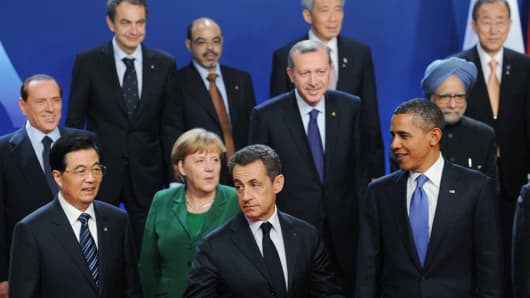G20 summits don't always set the pulse racing but this week's gathering of finance ministers and central bankers in Moscow has a better chance than most of grabbing the attention of financial markets.
The policymakers meet at a sensitive time with the U.S. Federal Reserve intent on slowing, then exiting a bond-buying program that has been creating $85 billion a month, and Beijing trying to rebalance the world's most dynamic economy.
Chinese growth slowed only moderately in the second quarter and after causing ructions in world financial markets, Fed Chairman Ben Bernanke has been at pains to stress he will only halt the money-printing presses if he sees stronger evidence of U.S. recovery.
(Read More: G-20: the World Does Not Need So Much Austerity)
Nonetheless, the Group of G20 leading economies will seek reassurances that neither will upset the apple cart. Emerging nations have seen dramatic investment outflows since the Fed announced its exit plan, forcing policy responses around the world.
Indonesia and Brazil have raised rates, India tightened liquidity as the rupee plunged to a record low and Turkey's central bank has intervened repeatedly to defend the lira.
"A key consideration going forward is the unwinding of unconventional monetary policy, where careful phasing and clear communication will be critical," International Monetary Fund chief Christine Lagarde said on Tuesday.
South Korea echoed that concern, its finance ministry demanding the Fed consider "not only its domestic conditions but also the global effects", before acting.
(Read More: EU Promises Less Austerity as G20 Debates Debt)
Bernanke will not be in Moscow but will deliver two days of testimony to the U.S. Congress earlier in the week.
Japan's top financial diplomat said Tokyo would put similar questions to the People's Bank of China about the wider impact of its actions. The bank is trying to rein in credit largely in a shadow banking system.
"The situation in China is not necessarily clear, and it would be desirable to clarify various data and issues," Mitsuhiro Furusawa, vice finance minister for international affairs, told Reuters. "We are paying close attention to see what the real picture is in China."
Japan's extraordinary stimulus programme will also be under scrutiny, particularly the structural reforms it has promised will accompany it. Tokyo has so far been given a free pass at international gatherings from countries which had previously urged it to get growth going. But there is growing disquiet.
(Read More: US Keeps Up Pressure on G20 Over Currencies)
"Most of the partners are losing more and more patience with Japan", one G20 source said. "They want to see concrete structural reforms."
A document setting out the position of the 27-nation European Union called on Tokyo to put in place a "medium-term fiscal consolidation plan" and focus on structural reforms to foster sustainable growth.
Furusawa said Japan would assure its G20 peers that its aggressive reflationary policies were not aimed at weakening the yen and would have positive effects for the world economy.
Emerging powers are flexing their muscles about the impact of a strong dollar. Brazil has been liaising with Beijing over ways to limit the effects of the dollar's rise on their economies though it is not clear what can be done or whether the BRICS (Brazil, Russia, India, China and South Africa) can offer a united front.
"We are working to enable closer cooperation in many aspects, including possible swap transactions," Russian Finance Minister Anton Siluanov, who will host the Thursday/Friday summit, told Reuters. "The process continues, but not fast."
Tax Dodging
The G20 ministers will also look at corporate tax evasion, which has become a hot political issue. The Organisation for Economic Co-operation and Development has been charged by the G20 with formulating measures to stop big companies shifting profits into tax havens.
A preliminary draft of the plan, seen by Reuters, showed the organisation has already identified a number of specific profit shifting schemes and aims for agreement on specific changes to international tax rules in one to two years.
A G20 official said the ministers would endorse the OECD plan while labor and finance ministers will issue a statement on balancing job creation policies with efforts to cut debt.
(Read More: Treasury delays offshore tax-dodging law)
The balance between austerity and growth remains a contentious theme as does Germany's call for concrete debt reduction targets to follow up on goals set three years ago.
"The U.S. is getting more and more angry about Europeans, who they think are not doing enough for growth," the official said.
In a tit-for-tat, the EU paper seen by Reuters said the lack of agreement on a credible medium-term fiscal consolidation plan in the United States was a risk to the global economy.
The G20 has not been able so far to agree on binding targets to reduce borrowing to follow on from a deal struck in Toronto in 2010, and officials said any hopes of new longer-term debt goals were receding fast.


